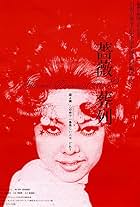

“Funeral Parade of Roses” has to be one of the most successful avant-garde and experimental cinema masterpieces the world has ever seen. And no, I am not even exaggerating. This irreverent psychosexual reinterpretation of the myth of Oedipus Rex by director Toshio Matsumoto – dense with visual exploration, meta-cinematography, and rebellion – is one of the cornerstones of the Japanese New Wave of the 1960s. Through a temporally deconstructed narrative as chaotic as it is ingenious, Matsumoto encapsulates and crystallizes the generational drama of Japanese youth.
Set in Tokyo at the peak of its socio-political turmoil, the work follows the ups and downs of Eddie, a young transgender woman grappling with her identity. The protagonist works at Genet, a gay bar in Tokyo managed by the gangster Gonda, whom she is in love with. Leda (Osamu Ogasawara) is the “Madame” and drag queen's leader, as well as being Gonda's (Yoshio Tsuchiya) partner.
Set in Tokyo at the peak of its socio-political turmoil, the work follows the ups and downs of Eddie, a young transgender woman grappling with her identity. The protagonist works at Genet, a gay bar in Tokyo managed by the gangster Gonda, whom she is in love with. Leda (Osamu Ogasawara) is the “Madame” and drag queen's leader, as well as being Gonda's (Yoshio Tsuchiya) partner.
- 2/13/2024
- by Siria Falleroni
- AsianMoviePulse
Staggering battle sequences, thrones of blood and the spirit of Macbeth are abroad in one of the greatest screen adaptations of Shakespeare
The re-release of Akira Kurosawa’s 1985 epic Ran (the word means “chaos”) is an opportunity to see this stunning free transformation of King Lear, one of the great screen adaptations of Shakespeare. Perhaps it was the defamiliarising effect of Kurosawa’s film which, for me, opened up the meaning of Lear: a kind of human arrogance and self-importance which, in the face of mortality, needs to believe the world will be a divided and diminished thing when we are gone.
As well as Lear, Ran draws on the dark spirit of Macbeth, with its images of a scheming wife, a throne of blood and massed soldiery: fatally misleading and ominous, as in Dunsinane. After a lifetime of brutal rule, ageing feudal lord Hidetora (Tatsuya Nakadai) tells his three...
The re-release of Akira Kurosawa’s 1985 epic Ran (the word means “chaos”) is an opportunity to see this stunning free transformation of King Lear, one of the great screen adaptations of Shakespeare. Perhaps it was the defamiliarising effect of Kurosawa’s film which, for me, opened up the meaning of Lear: a kind of human arrogance and self-importance which, in the face of mortality, needs to believe the world will be a divided and diminished thing when we are gone.
As well as Lear, Ran draws on the dark spirit of Macbeth, with its images of a scheming wife, a throne of blood and massed soldiery: fatally misleading and ominous, as in Dunsinane. After a lifetime of brutal rule, ageing feudal lord Hidetora (Tatsuya Nakadai) tells his three...
- 3/31/2016
- by Peter Bradshaw
- The Guardian - Film News
IMDb.com, Inc. takes no responsibility for the content or accuracy of the above news articles, Tweets, or blog posts. This content is published for the entertainment of our users only. The news articles, Tweets, and blog posts do not represent IMDb's opinions nor can we guarantee that the reporting therein is completely factual. Please visit the source responsible for the item in question to report any concerns you may have regarding content or accuracy.
